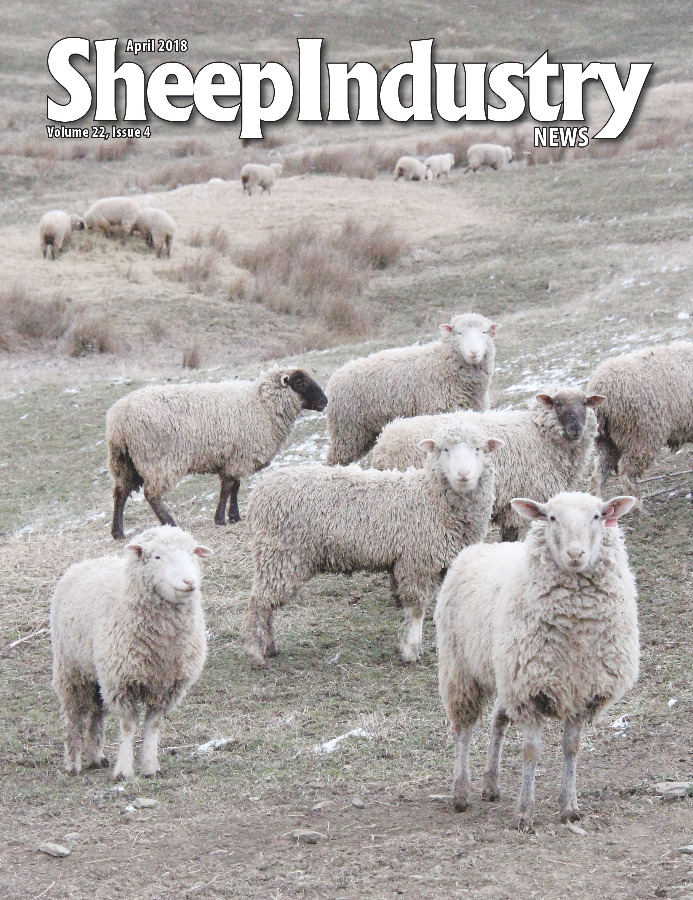To View the April 2018 Digital Issue — Click Here

ASI Spring Trip Proves Encouraging for Industry
Mike Corn, ASI President
ASI met with Secretary of Agriculture Sonny Perdue in March during the spring trip to Washington, D.C. He was very conversational and forthright in his comments and questions.
We described the sheep industry and our reliance on grazing most of the year and how that puts us in constant mode of protecting our animals from predators, therefore USDA’s Wildlife Services is crucial to producers. In the west, this often also means U.S. Forest Service grazing, and this moved our conversation to foreign herders and the bighorn sheep threat to sheep operations. ASI is likely one of the first groups Sec. Perdue has met with that talked federal land management and wildlife issues, so we intended the conversation to relay our unique qualities and challenges.
We focused on three requests strictly within the authority of USDA – with no need for further legislation – that will have an immediate impact on American sheep farms and ranches.
I addressed the need to fix the planning rule at the Forest Service that threatens dozens of sheep ranches using wild sheep as the excuse to push producers out of business.
Susan Shultz spoke to the critical need to get scientists hired so the U.S. Sheep Experiment Station can continue functioning. This was tied back to the wild sheep issue again as the researchers doing the best work for us are USDA Ag Research Service scientists.
Benny Cox followed with our request that USDA implement priorities for sheep, including: export markets for lamb such as Japan that has been reopened for beef but not lamb; as well as shipping to Europe and China. Funding the scrapie eradication plan and updating the rule for that program is another priority, all of these need to be accomplished well in advance of a proposal that would allow subsidized lamb into our market from the United Kingdom.
The secretary asked us for our top three requests and we quickly summarized our priorities. This is the third meeting in four months between ASI and political appointees at USDA on these very same priorities, so we are persistent if anything.
We also took the opportunity to address our concerns with cheap lamb imports.
ASI set up meetings with the Agricultural Marketing Service on our wool programs and market reporting, U.S. Fish and Wildlife Service and U.S. Forest Service – all of which provided opportunities to share information. Additionally Wildlife Services met with five of the state sheep associations on their livestock protection programs.
I was able to join the Montana Wool Growers that week also for a meeting with Sec. Ryan Zinke of the U.S. Department of the Interior, and again leaders focused hard on the bighorn threat and Bureau of Land Management lands policy.
We likely had our timing down very well to be in Washington, D.C., in early March so we could weigh in again on the Farm Bill as it gains momentum. Appropriations for sheep programs and interest in the U.S. House of Representatives to address the Ag Act for foreign ag labor were also timed very well to have an impact.
The ASI Executive Board met on the weekend ahead of the spring trip and got the council and committee recommendations knocked out. I appreciate the executive board taking time to get this done.
Instead of heading straight home from Washington, D.C., I made a stop in Ohio to join others in the industry in celebrating the 100th anniversary of the Mid-States Wool Growers Cooperative Association. It was a prime opportunity for me to visit with wool buyers that I have known and admired during my time in the industry. Mid-States General Manager Dave Rowe and his predecessor, Don Van Nostran, have done an excellent job of building Mid-States into a valuable asset for the entire sheep industry.


